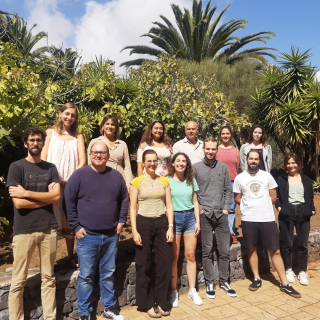Bibcode
Meneses-Goytia, S.; Peletier, R. F.; Trager, S. C.; Falcón-Barroso, J.; Koleva, M.; Vazdekis, A.
Referencia bibliográfica
Astronomy and Astrophysics, Volume 582, id.A96, 16 pp.
Fecha de publicación:
10
2015
Revista
Número de citas
7
Número de citas referidas
7
Descripción
We present a detailed study of the stars of the NASA InfraRed Telescope
Facility (IRTF) spectral library to understand its full extent and
reliability for use with stellar population (SP) modeling. The library
consist of 210 stars, with a total of 292 spectra, covering the
wavelength range of 0.94 to 2.41 μm at a resolution R ≈ 2000. For
every star we infer the effective temperature (Teff), gravity
(log g) and metallicity ([Z/Z⊙]) using a full-spectrum
fitting approach in a section of the K-band (2.19 to 2.34 μm) and
temperature-NIR colour relations. We test the flux calibration of these
stars by calculating their integrated colours and comparing them with
the Pickles library colour-temperature relations. We also investigate
the NIR colours as a function of the calculated effective temperature
and compared them in colour-colour diagrams with the Pickles library.
This latter test shows a good broad-band flux calibration, important for
the SP models. Finally, we measure the resolution R as a function of
wavelength. We find that the resolution increases as a function of
lambda from about 6 Å in J to 10 Å in the red part of the
K-band. With these tests we establish that the IRTF library, the largest
currently available general library of stars at intermediate resolution
in the NIR, is an excellent candidate to be used in stellar population
models. We present these models in the next paper of this series.
The IRTF spectral library is available at
irtfweb.ifa.hawaii.edu/spex/IRTF_Spectral_Library/
Proyectos relacionados

Huellas de la Formación de las Galaxias: Poblaciones estelares, Dinámica y Morfología
Bienvenida a la página web del g rupo de investigación Traces of Galaxy Formation. Somos un grupo de investigación amplio, diverso y muy activo cuyo objetivo principal es entender la formación de galaxias en el Universo de una manera lo más completa posible. Con el estudio detellado de las poblaciones estelares como bandera, estamos constantemente
Anna
Ferré Mateu

Huellas de la Formación de las Galaxias: Poblaciones estelares, Dinámica y Morfología
Bienvenida a la página web del g rupo de investigación Traces of Galaxy Formation. Somos un grupo de investigación amplio, diverso y muy activo cuyo objetivo principal es entender la formación de galaxias en el Universo de una manera lo más completa posible. Con el estudio detellado de las poblaciones estelares como bandera, estamos constantemente
Anna
Ferré Mateu